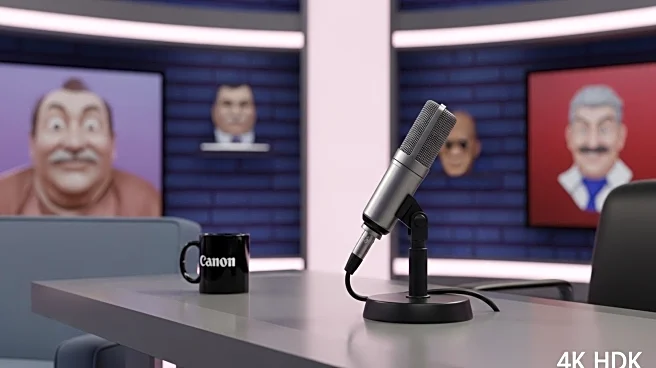What is the story about?
What's Happening?
Aziz Ansari faced scrutiny from Jimmy Kimmel regarding his involvement in the Riyadh Comedy Festival, a controversial event funded by the Saudi government. The festival, which included performances by comedians like Pete Davidson, Bill Burr, and Dave Chappelle, was criticized for prohibiting negative jokes about Saudi Arabia, its royal family, or religions. Human Rights Watch highlighted the festival's timing with the anniversary of journalist Jamal Khashoggi's murder, suggesting it was a distraction from Saudi Arabia's human rights violations. Ansari defended his participation by emphasizing the importance of engaging with repressive societies to foster dialogue and change, noting that half of Saudi Arabia's population is under 25 and open to new ideas.
Why It's Important?
The participation of high-profile comedians in the Riyadh Comedy Festival raises significant ethical questions about performing in countries with poor human rights records. It highlights the tension between cultural engagement and the potential endorsement of oppressive regimes. For the U.S. entertainment industry, this event underscores the complexities of international performances and the moral responsibilities of artists. The backlash from human rights organizations and the public could influence future decisions by entertainers regarding where they choose to perform, potentially impacting international cultural exchanges and the global perception of U.S. artists.
What's Next?
Aziz Ansari and other comedians have pledged to donate part of their performance fees to human rights organizations, although Human Rights Watch has declined these donations. The organization encourages comedians to advocate for the release of imprisoned Saudi activists. This situation may prompt further discussions within the entertainment industry about ethical considerations in international engagements. Comedians and artists might face increased pressure to take a stand on human rights issues, influencing their choices in future performances and collaborations.
Beyond the Headlines
The controversy surrounding the Riyadh Comedy Festival reflects broader issues of free speech and artistic expression in repressive regimes. It raises questions about the role of art in challenging or reinforcing political power structures. The decision by comedians to perform in Saudi Arabia could be seen as a form of soft diplomacy, potentially opening avenues for cultural dialogue and change. However, it also risks being perceived as complicity with a regime known for human rights abuses, highlighting the delicate balance artists must navigate in global engagements.















